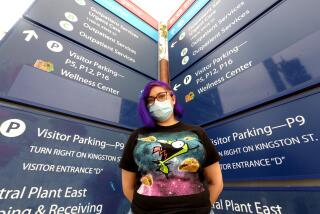Cuts Deal Blow to Emergency Room Services
- Share via
In the scramble to shrink Los Angeles County’s vast health care system, so many trauma care nurses were handed pink slips that the quality of treatment in the region’s emergency rooms could be jeopardized, public health workers said Saturday.
About 300 nurses with specialized training and experience to work in county hospital emergency rooms, trauma units and adult and neonatal intensive care units were told Friday that they are being laid off on Oct. 1, said Katherine Eaves, director of nursing services and education at County-USC Medical Center on Los Angeles’ Eastside.
At the emergency room at County-USC alone, Eaves and other hospital staffers said, about half of the 140 specially trained nurses have been targeted for layoffs.
Meanwhile, at Martin Luther King Jr./Drew Medical Center in South-Central Los Angeles, the county’s other major trauma center, five of eight night shift nurses in the emergency room were told they would be leaving, said Ethel Edmond, the liaison between emergency room nurses and paramedics.
“To me, that is a major, major problem,” said Edmond, “something they need to correct immediately.”
The health department’s sweeping layoff notices were based on seniority, meaning that no distinctions were made between specialists and regular nurses, most of whom have little experience treating victims of car crashes, gunshots and other life-threatening injuries.
Trauma nurses tend to have less seniority because of the demands of their jobs, leading to a high burnout rate. Few people last more than a few years before transferring or leaving to work in private hospitals, according to knowledgeable nurses and doctors.
“It’s like working at a MASH unit at wartime,” said County-USC emergency room nurse Dave Tashjian. “It gets crazy--so full that people are on gurneys in the hallways. Sometimes there are five or six ambulances outside, double-parked.”
Already, an effort is under way to reverse the layoff situation. Eaves of County-USC said she and ranking health services officials plan to appear before the Board of Supervisors on Tuesday. She said they will ask that the layoff notices be withdrawn or that the county pay to rehire 300 specially trained nurses.
“To lose an entire contingent of specialized people you spent months training is a problem,” she said. “It is essential that we go back to the board.”
The county’s top health officials could not be reached for comment Saturday. But last-minute changes to the board’s agenda released late Friday indicate that Health Services Director Robert Gates has asked the board to consider immediately hiring personnel “for critical needs areas.”
Supervisor Yvonne Brathwaite Burke said Saturday that she supported efforts to give specially trained nurses protection from layoffs.
Many nursing administrators, including Eaves, said they warned county officials that it would be risky to eliminate the specially trained nurses, many of whom have received more than $20,000 worth of specialized training and internship experience. But she said she was told that Civil Service rules require layoffs to be based on seniority, not the level of expertise. She said that the county tried to identify nurses that needed special exemptions from layoffs, but time ran out.
“Now,” Eaves said, “we are having to deal with the aftermath.”
If the specialized nurses are not replaced, according to opponents of the cuts, emergency rooms will be overwhelmed and patient care will suffer.
And even if they are replaced, many nurses and doctors said in interviews, it would be with other county nurses who have not worked under such trauma conditions for years, or who lack the experience and special qualifications altogether.
“If they do this Oct. 1, the impact will be death. It’s murder,” said Kathleen Thompson, an emergency room nurse at County-USC, whose job has not been eliminated. She said even the slightest hesitation by one of her crew can be the difference between life and death--a belief echoed by nurses, physicians and health administrators throughout the county system.
“The emergency trauma network was supposed to be left intact in all of this [budget cutting], but it’s not,” Thompson said.
Dr. Elpidio Resendez, an emergency room doctor at County-USC, said other nurses in the county system “may have seniority, but they don’t know emergency procedures. It will affect people’s lives.”
A health services liaison with the county’s largest employee union, Service Employees International Union, Local 660, said that although the union strongly advocates basing layoffs on seniority, it also recognizes the need to protect the specially trained nurses.
“Maybe there needs to be a special classification for them,” said B.J. Strother, director of health for the union.
* RELATED STORIES: A3
(BEGIN TEXT OF INFOBOX / INFOGRAPHIC)
What to Do If Your Clinic Is Closing
Patients should begin preparing now for the closure of county health centers and clinics Oct. 1. The Department of Health Services recommends that patients go to the county clinic closest to their home for information available on local hospitals and clinics that will remain open. Below are some suggestions.
* Get your records and other information at the county health center closest to you before it closes.
* Give yourself plenty of time to get to a new clinic or hospital. Going to a new facility means delays. Get bus routes. Check out pharmacies before prescriptions run out.
* Hold on to prescriptions and instructions from your current physician. Get copies of health records. There could be confusion over paperwork. If you have a new provider, arrange to have your medical records forwarded.
More to Read
Sign up for Essential California
The most important California stories and recommendations in your inbox every morning.
You may occasionally receive promotional content from the Los Angeles Times.













